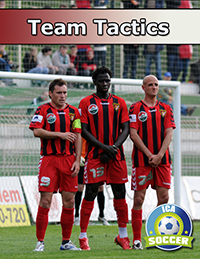Man for Man Marking
Man for man marking generally means marking an opponent in our defensive part of the field or in our own half. Some teams, notably the Germans and the Italians, employ man for man marking as soon as the opponents enter their half. Some man for man marking is only on the two or three strikers with a sweeper in behind them to cover space or take their role if they are beaten. Some teams employ just one man to mark the opposition's most dangerous player.

The factors needed to employ successful man for man marking are a good temperament (especially away from home), good discipline, good communication, and good technical skills, both in defending and when the ball is won. In defending man for man patience is vital. If you can make your opponent play square or back then he is not hurting our team as the ball and men therefore are not going in behind us. The man for man marker needs to be quick and brave. He will need to be good at the techniques of jockeying, shepherding and balancing the defense.
When the man for man marker is beaten then obviously other factors come into play. He should recover quickly.
The likelihood is that he will then become the supporting player to the man who is pressing the ball or the covering or balancing player. He therefore needs to know his recovery runs and his understanding of the principles of defending needs to be good - with communication vital.
As an individual the marker needs to be a good reader of the game (can he intercept?), a good tackler, physically strong and knowing relative to the position of his teammates, when to force the ball outside, when to force the ball inside. He will have to know the technique of the crouched position edging towards the attacker, and he will have to know about feinting to tackle, and to be extremely well focused on the ball.
Good defenders react to the ball, not to the body movements of the attackers. He will try to stay on his feet at all times, prevent turners from turning if possible and be excellent at timing his challenges and not giving away unnecessary free kicks in dangerous areas, i.e. in our defensive third.
He needs to be determined and a good passer of the ball. It is of no use being good at winning the ball if he cannot do anything with it. It is an extremely difficult task to be given and the more of the mentioned qualities the defender has the more successful he will be at his given task.
|
